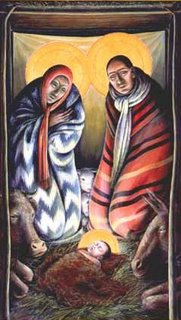
The Huron Carol
This is a new favorite Christmas Carol. I have heard it for years on a couple of Christmas CD's but have never paid attention to the lyrics. The composer placed the story of the birth of Jesus into their own locale, amongst the native French Canadians, Algonquin and Huron Indians(eh, you Hoser!). There's a great movie about missionaries to the Algonquin Indians of Canada, called The Black Robes. Algonquins were pretty fierce, according to that French Canadian film. Anyway, the tune is in minor key,...so it's not happy and cheerful sounding, which throws some folks off, but I think it really fits the lyrics and the area in which it was written. My attention was called to this song as an excellent choir at the Trinity Episcopal Cathedral in downtown Birmingham sang it at the Christmas Eve service my brother and I attended this year. As we left on that misty evening, the bells were pealing and I couldn't help but think that the bells were ringing in celebration and proclamation of the birth of our Savior, as the Word became flesh and dwelt among us.
Definition:Gitchi Manitou (or Gichi-Manidoo), in traditional Algonquian First Nations culture, is the Great Spirit, the Creator of all things and the Giver of Life.
The "Huron Carol" (or "'Twas in the Moon of Wintertime") is a Christmas hymn, written in 1643 by Jean de Brébeuf, a Christian missionary at Sainte-Marie among the Hurons. Brébeuf wrote the lyrics in the native language of the Huron people; the song's original Huron title is "Jesous Ahatonhia". The song's melody is a traditional French folk song, "Une Jeune Pucelle" ("A Young Maid").
The English version of the hymn, in place of the more traditional Nativity story, uses imagery familiar to North American aboriginal cultures of the time of composition: Jesus is born in a "lodge of broken bark", and wrapped in a "robe of rabbit skin". He is surrounded by hunters instead of shepherds, and the Magi bring him "fox and beaver pelts" instead of the more familiar gold, frankincense, and myrrh. The hymn also uses a traditional Huron name, Gitchi Manitou, for God. The original lyrics are now sometimes modified to use imagery more familiar to Christians who are not part of the Huron culture.
Brébeuf was martyred in 1649. He is one of the eight Canadian Martyrs.
English lyrics were written by Jesse Edgar Middleton in 1926. The song remains a common Christmas hymn in Canadian churches of many Christian denominations. Bruce Cockburn has also recorded a rendition of the song.
'Twas in the moon of wintertime when all the birds had fled
That mighty Gitchi Manitou sent angel choirs instead;
Before their light the stars grew dim and wondering hunters heard the hymn,
Jesus your King is born, Jesus is born, in excelsis gloria.
Within a lodge of broken bark the tender babe was found;
A ragged robe of rabbit skin enwrapped his beauty round
But as the hunter braves drew nigh the angel song rang loud and high
Jesus your King is born, Jesus is born, in excelsis gloria.
The earliest moon of wintertime is not so round and fair
As was the ring of glory on the helpless infant there.
The chiefs from far before him knelt with gifts of fox and beaver pelt.
Jesus your King is born, Jesus is born, in excelsis gloria.
O children of the forest free, O seed of Manitou
The holy Child of earth and heaven is born today for you.
Come kneel before the radiant boy who brings you beauty peace and joy.
Jesus your King is born, Jesus is born, in excelsis gloria.
Link to Lyrics in the native language and an MP3 of native Canadians singing the song in their language. This is much more dissonant and stark than the version I heard Christmas Eve, but I imagine it is as close to the original composition as anything:
No comments:
Post a Comment